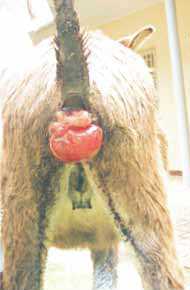Difference between revisions of "Rectal Prolapse - Donkey"
Jump to navigation
Jump to search
m (Text replace - '|rspace={{Donkey}} |pagetype=Donkey }}' to '|pagetype=Donkey }} {{infotable |Maintitle = This section was sponsored and content provided by '''THE DONKEY SANCTUARY''' |Maintitlebackcolour = B4CDCD }} [[Cat) |
|||
| Line 16: | Line 16: | ||
|linkpage =Surgery - Donkey | |linkpage =Surgery - Donkey | ||
|linktext =Surgery - Donkey | |linktext =Surgery - Donkey | ||
| − | |||
|pagetype=Donkey | |pagetype=Donkey | ||
}} | }} | ||
| + | {{infotable | ||
| + | |Maintitle = [[Sponsors#The Donkey Sanctuary|This section was sponsored and content provided by '''THE DONKEY SANCTUARY''']] | ||
| + | |Maintitlebackcolour = B4CDCD | ||
| + | }} | ||
| + | [[Category:Donkey]] | ||
Revision as of 10:35, 25 February 2010
| This article has been peer reviewed but is awaiting expert review. If you would like to help with this, please see more information about expert reviewing. |

Rectal prolapse is commonly seen in working donkeys overseas that are suffering from heavy parasitism, diarrhoea and malnutrition. Classification and treatment for the condition is as for the horse. There are two reports of rectal prolapse in donkeys in Egypt by Abd El-Kamm (1995).
References
- Thiemann, A. (2008) Surgery In Svendsen, E.D., Duncan, J. and Hadrill, D. (2008) The Professional Handbook of the Donkey, 4th edition, Whittet Books, Chapter 16
- Abd El-Karim, R.(1995). ‘Two cases of rectal prolapse in the donkey’.Equine Veterinary Education 7 (1). pp 12-14.
- Bell, N.J., Thomas, S. (2001). ‘Use of sterile maggots to treat panniculitis in an aged donkey’. Veterinary Record 149. pp 768-770.
|
|
This section was sponsored and content provided by THE DONKEY SANCTUARY |
|---|